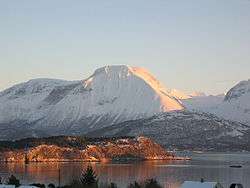mountain
English

Etymology
From Middle English mountayne, mountain, montaigne, from Anglo-Norman muntaine, muntaigne, from Old French montaigne, from Vulgar Latin *montānea, feminine of *montāneus (“mountainous”), alteration of Latin montānus, from mōns (“mountain”), from Proto-Indo-European *monti (compare Welsh mynydd (“mountain”), Albanian mat (“bank, shore”), Avestan 𐬨𐬀𐬙𐬌 (mati, “promontory”)), from *men- (“to project, stick out”). Displaced native Middle English berwe, bergh, from Old English beorg (whence English barrow); while partially displaced non-native Old English munt from Latin mons, (whence English mount).
Pronunciation
- (Received Pronunciation) IPA(key): /ˈmaʊntɪn/
Audio (UK) (file) - (General American) IPA(key): /ˈmaʊntən/, /ˈmaʊntn̩/[1][2] [ˈmãʊ̯̃(n)ʔn̩], [ˈmæ̃ʊ̯̃(n)ʔn̩]
Audio (US) (file) Audio (file) - Rhymes: -aʊntɪn, -aʊntən
Noun
mountain (plural mountains)
- An elevation of land of considerable dimensions rising more or less abruptly, forming a conspicuous figure in the landscape, usually having a small extent of surface at its summit.
- Everest is the highest mountain in the world.
- We spent the weekend hiking in the mountains.
- 1611, The Holy Bible, […] (King James Version), imprinted at London: By Robert Barker, […], OCLC 964384981, Jeremiah 50:6:
- My people hath been lost sheep: their shepherds have caused them to go astray, they have turned them away on the mountains: they have gone from mountain to hill, they have forgotten their restingplace.
- 1807, Joseph Wilson, “Preliminary Observations”, in A History of Mountains, Geographical and Mineralogical, volume 1, London: Nicol, White, Faulders & Asperne, pages xlvi–xlvii:
- Wherever a geologist directs his attention in the midst of a scene of mountains, traces of ruin and decay always meet his eye; and the lofty prominences of our globe, supposed to be the most permanent of nature's works, every where display unequivocal marks of the lapse and effects of time.
- Something very large in size or quantity; a huge amount; a great heap.
- He was a real mountain of a man, standing seven feet tall.
- There's still a mountain of work to do.
- (attributive) Of, belonging to, relating to, or found on a mountain; like a mountain in size; (of living things) growing or living on a mountain.
- some mountain ranges; the high mountain top; a scenic mountain view; the mountain lodge; the leaves of mountain cranberries; a mountain goat
- 2016, John Oliver, “Third Parties”, in Last Week Tonight with John Oliver, season 3, episode 26, written by Tim Carvell; Josh Gondelman; Dan Gurewitch; Jeff Maurer; Ben Silva; Will Tracy; Jill Twiss; Seena Vali; Julie Weiner, HBO, Warner Bros. Television:
- Okay… Okay, I-I-I’m still a little confused here. Did you actually climb Mount Everest? Or did you just dry-hump the side of it and then go home? “It was great! Now smell my finger! There’s still some mountain air on it!” What is wrong with you⁉
- (figuratively) A difficult task or challenge.
- (slang) A woman's large breast.
- (cartomancy) The twenty-first Lenormand card.
Usage notes
As with the names of rivers and lakes, the names of mountains are typically formed by adding the generic word before or after the unique term. In the case of mountains, when the word precedes the unique term, mount is used: Mount Olympus, Mount Everest, Mount Tai; when the word follows the unique term, mountain is used: Crowfoot Mountain, Blue Mountain, Rugged Mountain. Generally speaking, such names will be adjectives or attributive nouns, but many foreign placenames formed with adjectives—as China's Huashan—are translated as though they were proper names: Mount Hua instead of Hua Mountain or Flourishing Mountain.
Mountain chains are never named with mount, only with mountains, a translated term, or a pluralized name.
Synonyms
Hyponyms
Derived terms
- intermountain (adjective)
- mountaineer (noun/verb)
- ∴ mountaineering (noun)
- ∴ nonmountaineer (noun)
- mountainless (adjective)
- mountainscape (noun)
- mountainwards (adverb)
- mountainy (adjective)
- Chinese mountain cat
- mountain ash
- mountain bearberry
- mountain bike
- mountain boarding
- mountain building
- mountain buzzard
- mountain cat
- mountain climbing
- mountain cranberry
- mountain dew
- mountain dulcimer
- mountain fever
- mountain goat
- mountain gorilla
- mountain hare
- Mountain Home
- mountain laurel
- mountain lion
- mountain reindeer
- mountain sheep
- mountain sickness
- Mountain Standard Time
- mountain top removal mining
- mountain unit
- Mountain View
- mountain zebra
- Stoliczka's mountain vole
- White Cloud Mountain minnow
Related terms
- amount (noun/verb)
- dismount (verb)
- mount (noun)
- ∴ demount (verb)
- ∴ unmount (verb)
- mountainous (adjective)
- ∴ intramountainous (adjective)
- ∴ mountainously (adverb)
- ∴ mountainousness (noun)
- ∴ nonmountainous (adjective)
- ∴ unmountainous (adjective)
- paramount (adjective)
- surmount (verb)
Translations
|
|
|
See also
- Category:Mountains
Further reading


References
- mountain in The Century Dictionary, New York, N.Y.: The Century Co., 1911.
- mountain in Webster’s Revised Unabridged Dictionary, G. & C. Merriam, 1913.
- “mountain” in Dictionary.com Unabridged, Dictionary.com, LLC, 1995–present.,
- “OALD”, in (Please provide the title of the work), accessed 26 December 2012, archived from the original on 1 November 2012